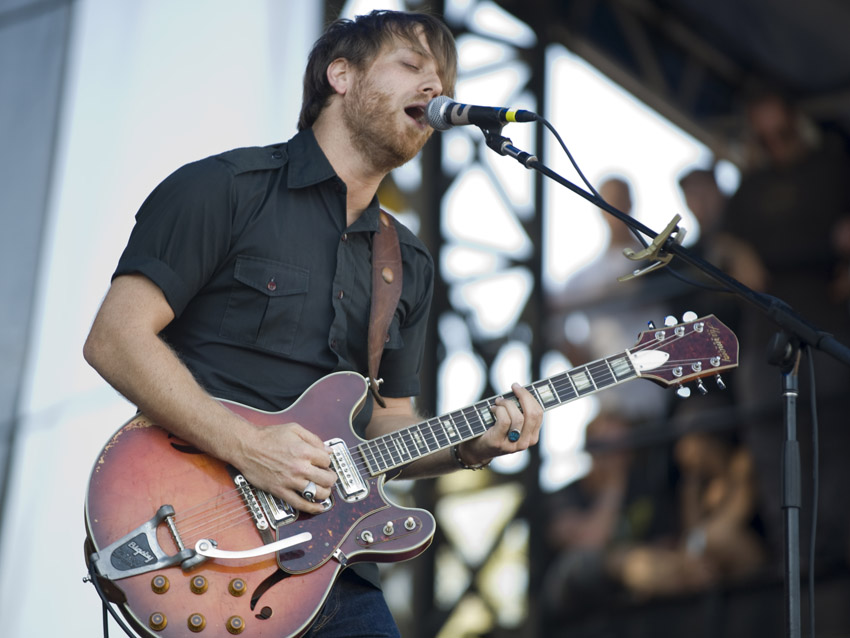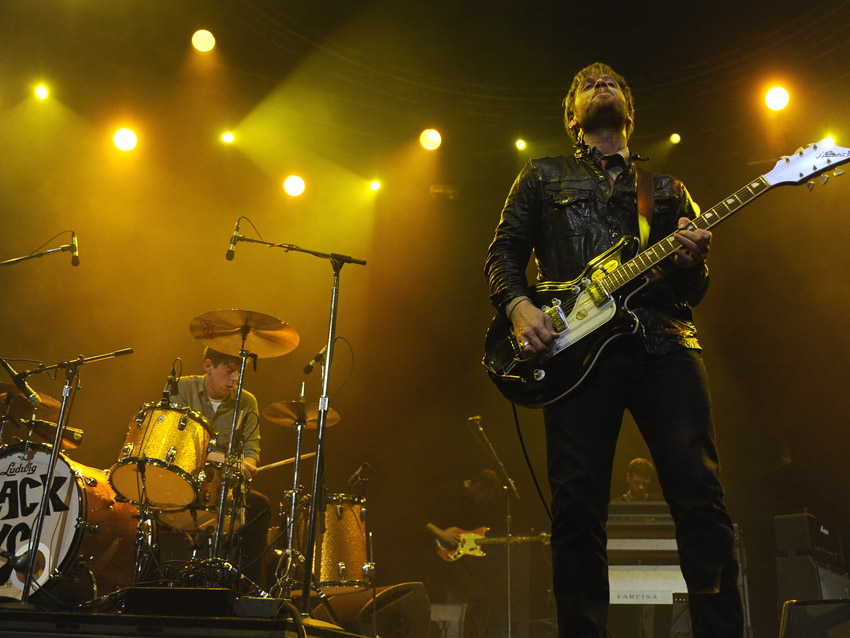Interview: The Black Keys on Brothers and the blues
Total Guitar meets guitarist Dan Auerbach

The Black Keys

The Black Keys

The Black Keys on stage December 2010. © Tim Mosenfelder/Corbis
Brothers, the sixth full-length album from Ohio-based blues-rock duo The Black Keys, was one of our favourite albums of last year.
Back in summer '10, shortly after the album's release, Total Guitar caught up with guitarist Dan Auerbach to find out about what went into making the album and to chat about the blues...
Did you spend more time honing your songwriting on Brothers than previously?
"Well, some of the songs were pretty old, but I think the sound of the record is just a testament to the way that Pat [Carney, drums] and I are able to work so quickly together and get our ideas across to each other so easily.
"I prefer limitations. It's almost like the more you know, the worse it gets."
"Once we start working on a song we finish it in a couple of hours and we don't come back to it. Like, [album opener] Everlasting Light, I originally wrote that on piano as a gospel song and we recorded it and it ended up sounding like it does on the record [a repeated fuzzed-up, palm-muted staccato riff], which is not necessarily how I had envisioned it, but it's just what we did that afternoon. The record only took a week and a half."
Your production approach seems to have changed since Attack & Release…
Get the MusicRadar Newsletter
Want all the hottest music and gear news, reviews, deals, features and more, direct to your inbox? Sign up here.
"One of the things that really made a big difference with this record is that we started every song with bass and drums, and that forced us to focus on the groove. That really helped to shape the sound of the record.
"I think the production's actually rawer on Brothers; it's just the way it's presented [that might sound smoother]. For instance, with the drums on Attack & Release there were maybe 15 mics on them; on the new record there's one or two. On the new record there's no song that's over 10 or 12 tracks in total."
What equipment did you record with?
"On this record I kept it pretty simple. I bought a couple of fuzz pedals. I have an old Italian Cry Baby wah that I really like, and a Boss Tremolo, and a couple of those small Line 6 ToneCore pedals - I think I had the Verbzilla reverb and the Echo Park delay.
"I used a little silverface Fender bass amp with a 10-inch speaker and just volume and tone controls. I used that for all of the bass, all of the keyboards and some of the guitar. Everything went through that little amp, or [producer] Mark Neil's Magnatone amplifier.
"I wanted to mix the bass and guitars and keyboards really closely. So, on some songs - like Next Girl - there's tremolo guitar with a wah-wah and bass and a Wurlitzer, all playing together and it's just one organic sound. It's not necessarily one instrument any more; it kind of becomes its own thing."
Do you ever find that blues rock is a limitation on your writing style?
"I prefer limitations. It's almost like the more you know, the worse it gets. I know so many guitar players or musicians who know so much about music and scales and modes and it gets to be so boring.
"At some point you have to put the guitar down, stop practising and read a book. Just try to get influenced by something other than music. And I think that [ethos] has helped me. I don't really practise any more; I like the feeling of picking up a guitar and being like, 'Whoa, how do I work this thing again?'"
Do you think that people have the wrong idea about what blues music is?
"Well, I wouldn't describe us as blues. I listened to blues music when I started to play guitar, so that's my foundation musically. Pat really does not like blues music, he's been tainted [by modern blues music].
"It's just so watered down and so boring, so I understand why he hates blues music. But I've slowly played him things that are interesting and he understands now that 'blues' is not a bad word. A lot of people think that and I understand why. It's sad."
For those who want to get back to the roots of blues, which guitarists should they check out?
"When I was starting to play guitar, Fred McDowell blew my mind. He played in open tuning with a slide - his fingerpicking was very rhythmic and a lot of it was just one chord.
"If you want to hear some weird electric shit, I would definitely say listen to Junior Kimbrough. He played an old [Fender] Super Reverb and a Les Paul copy. He played in his own style - this hypnotic fingerpicking. I love that stuff so much…
"You get guys nowadays, they're trying to be like Buddy Guy. They're playing solos but writing pop songs. The two are so different. They're trying to write some hits, trying to make some money…"
Do you think guitarists as a whole are losing touch with the organic feel of the instrument?
"Well, guitar is big business. All of those ['new blues'] guys, they're going to be popular and the guitar companies are gonna give them free guitars and shit. And then they'll just fill the airwaves with really bland, stupid, baloney.
"At the end of the day, you've gotta live with yourself. That music that you're doing? It's gonna live for longer than you are, so I just want to make music that I'm happy with and proud of, and I feel like Pat and I have done that. We've done everything our own way and I'm really happy with that."
Liked this? Now read: Gregg Allman's 10 greatest blues performances of all time
Connect with MusicRadar: via Twitter, Facebook and YouTube
Connect with Total Guitar: via Twitter and Facebook
Get MusicRadar straight to your inbox: Sign up for the free weekly newsletter
Matt is a freelance journalist who has spent the last decade interviewing musicians for the likes of Total Guitar, Guitarist, Guitar World, MusicRadar, NME.com, DJ Mag and Electronic Sound. In 2020, he launched CreativeMoney.co.uk, which aims to share the ideas that make creative lifestyles more sustainable. He plays guitar, but should not be allowed near your delay pedals.
“I’m beyond excited to introduce the next evolution of the MT15”: PRS announces refresh of tube amp lineup with the all-new Archon Classic and a high-gain power-up for the Mark Tremonti lunchbox head
“These guitars travel around the world and they need to be road ready”: Jackson gives Misha Mansoor’s Juggernaut a new lick of paint, an ebony fingerboard and upgrades to stainless steel frets in signature model refresh












